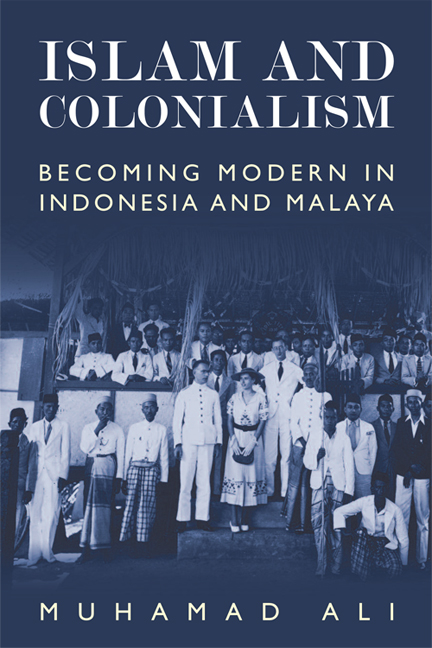Summary
It is commonly held that European colonisation and the efforts to modernise Muslim lands challenged Islam and undermined local custom, and that Islamisation was generally opposed to European ideas and technologies and rejected local beliefs and practices. While colonial historiographies tend to focus on the influence of European actors, Muslim nationalist and postcolonial scholars emphasise Muslim and native agencies. In the Netherlands East Indies and British Malaya, however, the ideas and actions associated with the concept of modernity were formed as an outcome of the interplay between Islamic reform and European colonialism. Islam and colonialism were not as confrontational as is often assumed. In this book, I offer a comparative and cross-cultural history of Islamic reform and European colonialism as both dependent and independent factors in shaping the multiple ways of becoming modern in the Netherlands East Indies (or Indonesia) and Malaya (today's Malaysia) during the first half of the twentieth century.
I argue that in formulating and advancing their respective projects of reform and modernisation, Muslim reformers and European colonial scholars and administrators often differed, but they were not always antagonistic. Although they often understood progress differently, they sometimes worked in tandem in order to achieve common ends. For example, motivated by a mixture of economic, political and moral interests, Indonesian and Malay Muslim reformers understood Islam as a progressive faith and thus sought to build and foster communities by creating and expanding organisations and selectively borrowing Western vocabularies and organisation models. The colonial powers sought to know Islam and maintain control by conducting research on Islamic practices and local cultures, often accommodating Islamic scholars and the native elite. They, too, recognised the role of Islam and custom in modernising local communities. The colonial bureaucracies were willing to accommodate sultans and native officials in developing systems of economy, government and law that would be not necessarily incompatible with Islamic norms of economy, government and law. The Muslim reformers developed publications to disseminate Islam and practical information that were not necessarily posing a threat to colonial administrations, even as they challenged discriminatory colonial policies and demanded ‘rights’ for the native populations. As the colonialists introduced new forms of government, Muslim reformers began to appropriate Arabic concepts of siyasah and Western notion of politics and government
- Type
- Chapter
- Information
- Islam and ColonialismBecoming Modern in Indonesia and Malaya, pp. 1 - 32Publisher: Edinburgh University PressPrint publication year: 2015



